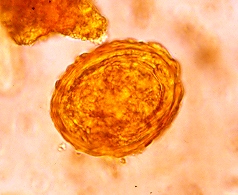Helminthotherapy
HELMINTHOTHERAPY
 Helminthotherapy (also known as helminth therapy) is the use of certain nematode worms as agents for the stimulation of host immunological responses, appropriate to the alleviation of certain inflammatory, autoimmune diseases.
Helminthotherapy (also known as helminth therapy) is the use of certain nematode worms as agents for the stimulation of host immunological responses, appropriate to the alleviation of certain inflammatory, autoimmune diseases.
In areas where helminth infections are common, there is a low prevalence of autoimmune diseases. In addition, the frequency of autoimmune and chronic inflammatory organic diseases has increased dramatically in the last century. It is assumed that the increase in hygiene standards reduced the interactions with helminth parasites that coevolved with the immune system and are crucial for its proper functioning. This observation gave rise to the hygiene hypothesis, claiming that certain organisms which were abundant in the human microenvironment hold an immuno-regulatory and immunosuppressive effect, therefore, their eradication led to an increase in immune mediated diseases. This hypothesis laid the foundation for several directions of research which demonstrated an immunosuppressive and immuno-regulatory effect of helminths on both the acquired and the innate immune systems. These studies led to the examination of the therapeutic potential of helminths and their components in treating different autoimmune diseases such as Crohn’s diseases (inflammatory bowel disease), rheumatoid arthritis, multiple sclerosis, ulcerative colitis and systemic lupus erythematosus. Studies also showed that anti-helminthic treatment increases symptoms of atopy that helminths protect against illness in animal models of immune-mediated disease by promoting regulatory responses and that treatment of patients with helminths reduces disease activity. An effective impact on Crohns disease in 80% of patients was achieved in a trial with Trichurissuis infection. Other helminths successfully used to control immunological disease are Trichuristrichiura, Oxyuris spp., Schistosoma haematobiumand Enterobiusvermicularis.
These observations suggest that helminths, although parasites, may contribute something in return to their hosts and the loss of helminths removes a natural governor that helped to prevent disease due to immune dysregulation.
References
Elliott DE, Summers RW, Weinstock JV. 2007. Helminths as governors of immune-mediated inflammation. Int J Parasitol 2007; 37: 457–64. pdf
Erb KJ. 2009. Can helminths or helminth-derived products be used in humans to prevent or treat allergic diseases? Trends Immunol. 30, 75–82. pdf
Elliott DE, Weinstock JV. 2012. Helminth-host immunological interactions: prevention and control of immune-mediated diseases. Ann. N.Y. Acad. Sci. 1247, 83–96. pdf
Croft AM, Bager P, Kumar S. 2012. Helminth therapy (worms) for allergic rhinitis. Cochrane Database Syst Rev; CD009238.
Tilp C, Kapur V, Loging W, Erb KJ. Prerequisites for the pharmaceutical industry to develop and commercialize helminths and helminth-derived product therapy.Int J Parasitol. 2013; 43: 319–25. pdf
Leonardi I, Frey I, Rogler G. Helminth therapy for organic diseases? Transl Res. 2015 ; 166: 586-601. doi: 10.1016/j.trsl.2015.06.016.
Maizels RM. Parasitic helminth infections and the control of human allergic and autoimmune disorders.ClinMicrobiol Infect. 2016; 22: 481-6.doi: 10.1016/j.cmi.2016.04.024. pdf
Maizels RM, McSorleyHJ. Regulation of the host immune system by helminth parasites.J Allergy ClinImmunol. 2016;138: 666-75. doi: 10.1016/j.jaci.2016.07.007. pdf
Registration Form
International Course in Maggot Therapy Registration Form We look forward to welcoming you to the International Maggot Therapy Course in Izmir, TürkiyeDownload Registration Form > Executive Committee Society Members Membership...
Registration Form
International Course in Maggot Therapy Registration Form We look forward to welcoming you to the International Maggot Therapy Course in Izmir, TürkiyeDownload Registration Form > Executive Committee Society Members Membership...
